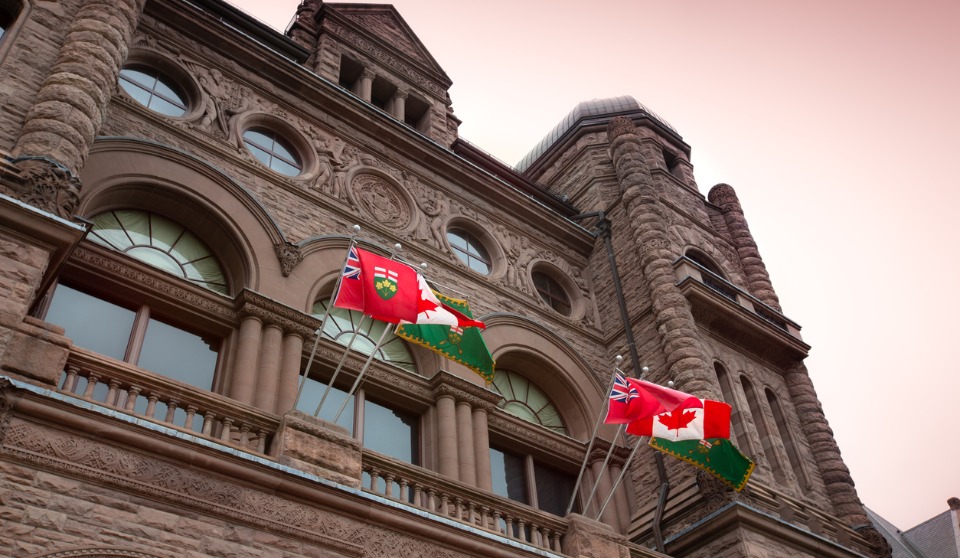
Summary of government’s plan to ‘modernize’ Ontario’s legal framework

At nearly 80 pages in length, a Dec. 9 proposal by Attorney General Doug Downey would make expansive changes to many aspects of daily life for lawyers, including the provision of legal aid, the lawyer discipline process, and the way the law treats juries, creditors, estates, marriages, justices of the peace, notaries and class actions.
The Progressive Conservative government’s plan, bill 161, aims to make the justice system “smarter and stronger,” Downey said. In doing so, it suggests sweeping changes, impacting the: Administration of Justice Act, Canadian Public Accountability Board Act, Civil Remedies Act, Class Proceedings Act, Commissioners for taking Affidavits Act, Courts of Justice Act, Creditors’ Relief Act, Crown Liability and Proceedings Act, Estates Act, Execution Act, Judicial Review Procedure Act, Juries Act, Justices of the Peace Act, Law Society Act, Legal Aid Services Act, Limitations Act, Marriage Act, Notaries Act, and the Public Guardian and Trustee Act.
Below are a few of the changes highlighted by the government.
|
Civil Remedies Act |
Simplify the processes around property forfeiture by allowing personal property to be forfeited without a court order in uncontested cases |
|
Law Society Act |
Provide the Law Society of Ontario with the “tools it needs to sufficiently censure lawyers and paralegals who fail to meet the highest standards of learning, competence and professional conduct.” Increase the maximum fine for professional misconduct and allow the Law Society of Ontario to regulate law firms in addition to lawyers and paralegals. |
|
Vital Statistics Act |
Reduce the burden on families and facilitate faster resolutions for tragic incidents of death where there are no remains |
|
Courts of Justice Act and the Justices of the Peace Act |
Judicial officials who are removed from office as a result of their misconduct would have to pay their own legal fees out of pocket. |
|
Juries Act |
Remove the requirement to include juror addresses on jury panel lists. |
|
Victims' Bill of Rights |
Amend Regulation 456/96 to make it easier for victims to obtain damages in civil proceedings against offenders convicted of the offence of non-consensual distribution of an intimate image. |
|
Legal Aid Services Act |
Allow LAO to provide legal information, unbundled legal services and full representation. Provide LAO the authority to make rules about operational matters. |
|
Notaries Act, Commissioners for taking Affidavits Act |
Allow for remote or virtual commissioning and notarization online. Allow paralegals to be appointed as notaries. |
|
Courts of Justice Act |
Streamline reappointing case management masters. Remove the seven-year reappointment process at the Superior Court of Justice for those 65 years old and under. |
|
Administration of Justice Act |
Bring the lack of financial means test that a judicial official must apply when considering a fee waiver in line with a 2014 Supreme Court of Canada decision. Allow judicial officials to “address potential abuses” of fee waivers. |
|
Judicial Review Procedure Act |
Will align some rules for judicial review with federal requirements, and will make housekeeping amendments to remove provisions that are no longer needed. |
|
Limitations Act |
Reference provisions that have been previously amended and remove references to provisions that no longer exist. |
|
Law Society Act, Legal Aid Services Act, Canadian Public Accountability Board Act |
Fix French translation in the acts. |
|
The Crown Liability and Proceedings Act |
Clarify that a plaintiff's limitation period does not run while the plaintiff is seeking leave. |
|
Creditors' Relief Act and Execution Act |
Remove the outdated provision regarding the sheriff’s trust account; clarify the definition of sheriff to include Ministry employees who are assigned sheriff powers. |
|
Courts of Justice Act, Absconding Debtors Act, Assignments and Preferences Act, Construction Act, Evidence Act, Human Rights Code, Law Society Act, Mortgages Act |
Remove references to traditional judicial masters. |
|
Public Guardian and Trustee Act |
Allow the threshold (of beneficiaries when someone for whom the Public Guardian and Trustee holds property dies) to be set by regulation |
|
Law Society of Ontario Tribunal Regulation |
Eliminating the current requirement, for certain types of motions, that the same Law Society Tribunal members who hear the merits of a proceeding (in which a motion is brought) must also hear the motion. Allow a single member panel to hear a motion to exclude the public and/or witnesses from all or part of a hearing to protect personal information from being shared. |
|
Class Proceedings Act |
New requirements for settlements; dismiss dormant cases; establish safeguards in relation to third-party litigation funding; require all notices are by default in plain language and available in French; encourage the use of preliminary motions; establish a more stringent test to determine whether a class action is the “preferable procedure” as opposed to other available alternative dispute mechanisms or compensation schemes. Allows the court to withhold a portion of the fees until the court can review how class members were compensated; “enhancing transparency regarding class counsel fees, as well as settlement and award distributions.” |
|
Estates Act |
Exempt probate applicants from the requirement to post security for small estates in certain cases. |
|
Marriage Act |
Authorize out-of-province Canadian judges and Ontario case management masters to perform marriage ceremonies in Ontario; Indigenous groups in Ontario will be able to designate people who are authorized to perform marriage ceremonies. |
- With files from Anita Balakrishnan